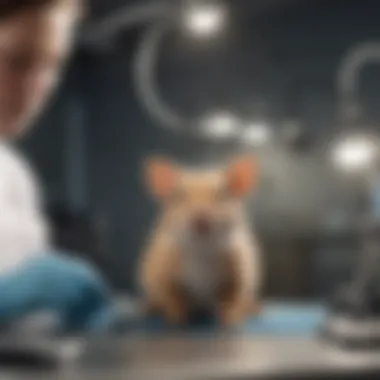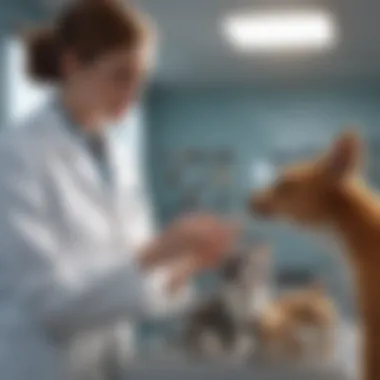Unveiling the Diverse Veterinarian Career Pathways for Future Aspirants


Market Insights
The field of veterinary medicine is experiencing notable growth, driven by a range of factors. Current trends show an increasing demand for specialized veterinary services, particularly in areas such as exotic animal care and alternative therapies. Moreover, the rise of telemedicine in veterinary practice has generated significant interest, allowing for remote consultations and diagnosis. These advancements signal a shift in how veterinary care is delivered and received, presenting new opportunities for professionals in the industry.
Career Paths Overview
Veterinary medicine offers a diverse spectrum of career paths beyond the conventional clinic setting. From equine and livestock practice to wildlife conservation and public health, veterinarians can choose from a variety of specialized fields based on their interests and expertise. Each pathway presents unique challenges and rewards, catering to individuals with distinct passions within the broader realm of animal healthcare.
Emerging Opportunities
In today's dynamic healthcare landscape, veterinarians are increasingly branching into non-traditional roles and industries. The intersection of veterinary medicine and technology has paved the way for innovations such as telemedicine platforms, wearable health monitoring devices for pets, and genetic testing for breed-specific health risks. These emerging opportunities signify a shift towards a more interconnected and data-driven approach to animal care, opening up new possibilities for veterinarians to expand their horizons.
Research and Development
Research plays a fundamental role in advancing veterinary medicine and improving animal health outcomes. Investigative studies drive innovation in treatments, diagnostics, and preventive measures, shaping the future of veterinary care. By engaging in research initiatives, veterinarians can contribute to scientific knowledge, promote evidence-based practices, and enhance the quality of care provided to animal patients. Collaboration with academic institutions and industry partners further enriches opportunities for professional growth and discovery within the field.
Practical Skills Development
In addition to academic and clinical expertise, veterinarians benefit from honing a diverse set of practical skills essential for success in their careers. Effective communication with clients, problem-solving abilities, and strong business acumen are vital in navigating the complexities of veterinary practice. Furthermore, staying updated on industry trends, pursuing continuing education opportunities, and fostering a network of professional connections are integral to personal and professional development in the competitive landscape of veterinary medicine.
Synthesis of Opportunities
To thrive in the multifaceted world of veterinary medicine, individuals must strategically leverage the array of career opportunities available to them. By exploring different paths, embracing emerging trends, and prioritizing continuous learning, veterinarians can build fulfilling and impactful careers that align with their aspirations and values. Understanding the breadth of possibilities within the field empowers professionals to make informed decisions, adapt to changing landscapes, and contribute meaningfully to the health and welfare of animals and communities.
Introduction
Veterinarians play a crucial role in safeguarding animal health, contributing to the welfare of both companion and agricultural animals. The importance of this topic lies in the intricate web of responsibilities that veterinarians shoulder, from diagnosing illnesses to implementing preventive measures and even conducting surgeries. Understanding the nuances of different veterinary specialties is essential for aspiring veterinarians to tailor their career paths to align with their interests and strengths.
Moreover, the relevance of this introduction extends beyond highlighting the diverse career options within veterinary medicine. It also underscores the continuous evolution of the veterinary field, where advancements in technology and a growing focus on public health are reshaping the way veterinarians approach animal care. By delving into the various career trajectories available, individuals can gain clarity on the breadth of opportunities awaiting them in the field of veterinary medicine, paving the way for a fulfilling and impactful career.
Traditional Veterinary Roles
Traditional veterinary roles play a fundamental part in the article highlighting the key aspects of veterinary medicine. These roles, such as Small Animal Practice, Large Animal Practice, and Exotic Animal Care, are the cornerstone of the veterinary profession, providing care and treatment to a diverse range of animals.
Small Animal Practice
In Small Animal Practice, veterinarians specialize in the clinical diagnosis and treatment of pets, ranging from dogs and cats to rabbits and guinea pigs. The focus is on providing medical care, diagnosing illnesses, and administering treatments tailored to the individual needs of companion animals. This specialization offers veterinarians the opportunity to develop close relationships with pet owners and make a significant impact on the well-being of beloved animal companions.
Clinical Diagnosis and Treatment
Clinical Diagnosis and Treatment in Small Animal Practice involves the meticulous examination and evaluation of pets presenting with various medical conditions. Veterinarians use diagnostic tools such as blood tests, imaging techniques, and physical examinations to identify ailments accurately. This aspect is crucial in formulating effective treatment plans and ensuring the best possible outcomes for the animals under care.
Surgical Procedures
Surgical Procedures in Small Animal Practice encompass a broad spectrum of operations, from routine spays and neuters to complex orthopedic surgeries. Veterinarians skilled in surgical techniques perform procedures with precision and care, often utilizing advanced technology to enhance surgical outcomes. The ability to conduct surgical interventions safely and effectively is a valuable asset for practitioners in this field.


Preventive Care
Preventive Care in Small Animal Practice emphasizes the importance of proactive health measures to maintain pets' well-being and prevent disease. This includes vaccinations, parasite control, dental care, and nutritional counseling. By focusing on preventive strategies, veterinarians can help pet owners optimize their pets' health and longevity, fostering a strong bond between the veterinary team, the animals, and their caregivers.
Large Animal Practice
Large Animal Practice revolves around the health management of livestock, equine species, and other sizable animals. Veterinarians in this field play a pivotal role in ensuring the welfare of agricultural animals and optimizing production efficiency.
Livestock Health Management
Livestock Health Management entails overseeing the health and well-being of farm animals, including cows, pigs, sheep, and goats. Veterinarians monitor herd health, implement disease control protocols, and advise farmers on nutrition and housing practices to promote optimal animal welfare and productivity. The ability to manage large-scale animal populations and address herd health challenges is essential for success in this specialization.
Reproductive Health Services
Reproductive Health Services in Large Animal Practice focus on breeding and fertility interventions for livestock and equine species. Veterinarians provide reproductive assessments, artificial insemination, and obstetrical care to enhance breeding outcomes and maintain genetic diversity within animal populations. Expertise in reproductive biology and advanced reproductive technologies is key to delivering comprehensive reproductive health services.
Herd Health Maintenance
Herd Health Maintenance involves preventive health programs tailored to herd animals, such as preventive vaccination schedules and parasite control strategies. Veterinarians collaborate with farmers to develop customized health plans that address the specific needs of animal groups, reduce disease incidence, and improve overall productivity. The ability to balance individual animal care with population-level health promotion sets apart practitioners specializing in herd health maintenance.
Exotic Animal Care
Exotic Animal Care encompasses veterinary services for non-traditional companion animals, wildlife, and exotic species in zoos and conservation settings. Veterinarians specializing in exotic animal care face unique challenges and opportunities in providing healthcare to a diverse range of species.
Zoo Veterinary Medicine
Zoo Veterinary Medicine focuses on the health and welfare of animals housed in zoological institutions. Veterinarians in this field collaborate with zoos, aquariums, and wildlife parks to ensure the well-being of captive species through preventive medicine, diagnostic procedures, and treatment interventions. The preservation of endangered species and the conservation of wildlife habitats are central goals of zoo veterinary medicine.
Wildlife Rehabilitation
Wildlife Rehabilitation involves caring for injured, orphaned, or displaced wild animals with the aim of releasing them back into their natural habitats. Veterinarians in wildlife rehabilitation centers provide critical medical care, rehabilitation exercises, and behavioral assessments to help wild animals recover and thrive in the wild. The dedication to rehabilitating and rewilding native wildlife species is a hallmark of wildlife rehabilitation practice.
Conservation Efforts
Conservation Efforts in Exotic Animal Care extend beyond individual animal health to encompass broader conservation initiatives. Veterinarians engaged in conservation work collaborate with conservation organizations, governmental agencies, and local communities to protect endangered species, restore habitats, and implement sustainable conservation practices. The intersection of animal health, ecosystem conservation, and public education underscores the vital role of veterinarians in global conservation efforts.
Emerging Fields in Veterinary Medicine
Exploring the realm of Emerging Fields in Veterinary Medicine opens up a vista of new possibilities and directions within the veterinary profession. This section aims to shed light on the significance and potential avenues that these evolving fields offer to veterinary professionals. As the landscape of veterinary medicine continually expands and adapts to meet modern challenges, understanding the Emerging Fields becomes paramount for those seeking to stay at the forefront of the industry.
Research and Academia
In delving into Research and Academia, the focus is on the pivotal role these disciplines play in shaping the future of veterinary medicine. Through Biomedical Research, veterinarians contribute to groundbreaking discoveries and advancements in medical sciences. The section highlights the unique characteristics of Biomedical Research, emphasizing its relevance in pushing the boundaries of veterinary knowledge and practice.
Veterinary Education
Another crucial aspect, Veterinary Education, serves as the cornerstone for grooming the next generation of veterinary professionals. By discussing its key characteristics and advantages within this article, the importance of quality education in producing competent veterinarians is underscored. Describing the specific features of Veterinary Education adds layers to understanding its significant role in the overarching field of veterinary medicine.


Pharmaceutical Development
The exploration of Pharmaceutical Development unveils a realm where veterinarians actively participate in the creation and improvement of medications tailored for animal health. This section brings to the forefront the distinctive aspects of Pharmaceutical Development, elucidating why it stands as a popular choice for veterinarians looking to make a lasting impact. By evaluating the advantages and potential drawbacks of this field, readers gain a nuanced perspective on its contributions to the veterinary landscape.
Public Health and Epidemiology
Public Health and Epidemiology form essential pillars of veterinary medicine, reflecting the interconnectedness between animal and human well-being. This section delves into Disease Control Programs, shedding light on their integral role in preventing and managing the spread of diseases. Understanding the unique features and considerations of Disease Control Programs within the context presented herein offers insight into their critical relevance.
Food Safety Regulation
Ensuring food safety is a shared responsibility encompassing various fields, with veterinarians playing a vital role in Food Safety Regulation. This subsection dissects the key characteristics of such regulations, emphasizing their significance in safeguarding public health. By considering both the advantages and disadvantages of this aspect, readers gain a comprehensive understanding of its impact within the veterinary sphere.
Global Health Initiatives
Global Health Initiatives encompass a broad spectrum of collaborative efforts aimed at tackling health challenges on a global scale. By illuminating the key characteristics and motivations behind such initiatives, readers gain insight into their far-reaching impact. Detailing the advantages and drawbacks of engaging in Global Health Initiatives provides a well-rounded perspective on how veterinarians can contribute to global well-being.
Animal Welfare and Advocacy
Advocating for animal welfare stands as a central tenet in veterinary medicine, encompassing various realms such as Shelter Medicine. This section articulates the importance of Shelter Medicine in providing care and sanctuary for vulnerable animals. By outlining the unique features and possible drawbacks of this aspect, readers attain a holistic view of the commitments and challenges inherent in advocating for animal rights.
Animal Rights Activism
In the sphere of Animal Rights Activism, veterinarians lend their voices to champion ethical treatment and protection of animals. By highlighting the core characteristics and benefits of engaging in Animal Rights Activism, this subsection underscores the instrumental role veterinarians play in shaping societal perspectives towards animal welfare. Examining both the advantages and disadvantages of this activism offers a balanced view of its impact within the veterinary domain.
Policy Development
Policy Development stands as a crucial mechanism for enacting legislative changes that advance animal welfare and veterinary practices. By exploring the key characteristics and importance of Policy Development within this article, readers gain insights into how policies shape the veterinary landscape. Assessing the unique features and potential challenges associated with Policy Development paints a comprehensive picture of its impact on veterinary medicine.
Specialized Veterinary Careers
Specialized veterinary careers play a pivotal role in the field of veterinary medicine. These careers offer unique opportunities for veterinarians to focus on specific areas of expertise, providing specialized care and solutions for animals in need. By delving deep into specialized veterinary careers, professionals can enhance their skills, contribute to animal welfare, and advance the field of veterinary medicine.
Veterinary Pathology
Veterinary Pathology is a critical aspect of specialized veterinary careers, encompassing various subspecialties that are vital for diagnosing diseases and understanding the health of animals. Within this field, Diagnostic Pathology stands out as a key element, specializing in the examination of tissues and cells to identify diseases and provide accurate diagnoses. Its meticulous approach and attention to detail make Diagnostic Pathology essential for shedding light on complex medical conditions in animals.
Forensic Veterinary Pathology
Forensic Veterinary Pathology is another vital component of veterinary pathology, focusing on investigating the cause of death in animals and uncovering any signs of abuse or neglect. This subspecialty requires keen observation skills and a thorough understanding of forensic techniques to gather evidence and determine the circumstances surrounding the animal's demise. Despite its challenging nature, Forensic Veterinary Pathology serves as a crucial tool in animal welfare and legal investigations.
Research Pathology
Research Pathology plays a significant role in advancing veterinary medicine through in-depth studies and experimentation. This subfield involves exploring new diagnostic methods, treatment options, and disease mechanisms to improve animal health outcomes. By conducting innovative research and collaborating with other professionals, veterinarians specializing in research pathology contribute to the continuous development of veterinary medicine.
Equine Medicine
Equine Medicine embodies a specialized branch of veterinary care dedicated to horses and other equine species. Within this field, Equine Sports Medicine emerges as a crucial aspect, focusing on enhancing the health and performance of athletic horses. Veterinarians specializing in this area offer tailored treatment plans and rehabilitation strategies to optimize the well-being of sport horses and address musculoskeletal issues.


Reproductive Services
Reproductive Services in Equine Medicine concentrate on managing and enhancing the fertility and breeding processes in horses. This subfield involves evaluating reproductive health, conducting breeding examinations, and overseeing gestation to ensure successful reproduction. Equipped with advanced reproductive techniques, veterinarians specializing in this area play a vital role in preserving equine genetics and facilitating breeding programs.
Racetrack Practice
Racetrack Practice represents a specialized avenue within Equine Medicine, catering to the unique health needs of racehorses and supporting their performance on the track. Veterinarians engaged in racetrack practice offer essential services such as pre-race evaluations, injury prevention strategies, and post-race care to ensure the well-being and longevity of racehorses. Their expertise is essential in maintaining the health and competitive edge of equine athletes.
Avian and Exotic Species Medicine
Avian and Exotic Species Medicine encompasses the specialized care and treatment of non-traditional pets and wildlife. Within this field, Avian Veterinary Care plays a crucial role in providing medical services to birds of all species, including pet birds, poultry, and exotic avian species. Veterinarians specializing in avian care are trained to address the unique health requirements and behaviors of birds, offering comprehensive medical support and preventive care.
Reptile Medicine
Reptile Medicine focuses on the healthcare of reptiles, ranging from snakes and lizards to turtles and amphibians. This specialized area of veterinary medicine deals with the diagnosis and treatment of reptile-specific conditions, nutritional counseling, and environmental enrichment for reptilian species. With a deep understanding of reptile biology and habitats, veterinarians specializing in reptile medicine play a vital role in promoting the well-being of these unique creatures.
Invertebrate Medicine
Invertebrate Medicine delves into the treatment and care of invertebrate species, including insects, arachnids, and other non-vertebrate organisms. As a lesser-known but critical aspect of veterinary medicine, invertebrate medicine requires specialized knowledge of these creatures' physiology, behaviors, and health issues. Veterinarians specializing in this field offer essential services to hobbyists, zoos, research institutions, and ecological organizations, contributing to the welfare of diverse invertebrate species.
Non-Traditional Paths for Veterinarians
The section on Non-Traditional Paths for Veterinarians within the context of this comprehensive article provides a deep insight into alternative career avenues within the field of veterinary medicine. In today's evolving landscape, traditional roles are not the only defining aspect of this profession. Examining these unconventional paths is crucial for individuals seeking diverse opportunities beyond the typical clinical setting. By venturing into non-traditional roles, veterinarians can explore innovative ways to contribute to animal welfare and global health. This section highlights the key elements that make Non-Traditional Paths for Veterinarians a significant aspect of this article, shedding light on the varied benefits and considerations associated with such career choices.
One Health Initiatives
Interdisciplinary Collaborations
Interdisciplinary Collaborations play a pivotal role in One Health Initiatives by fostering collaborations across multiple disciplines, including veterinary medicine, human health, and environmental science. This unique approach recognizes the interconnectedness of human, animal, and environmental health, aiming to address complex global challenges holistically. Collaborating with professionals from diverse fields enriches the decision-making process, encourages innovation, and promotes comprehensive solutions to complex health issues. The advantages of Interdisciplinary Collaborations in this article lie in its ability to tackle multifaceted problems effectively and implement sustainable solutions for the betterment of society.
Human-Animal-Environment Connections
The concept of Human-Animal-Environment Connections underscores the interdependence among humans, animals, and the environment, emphasizing the need for integrated approaches to health management. By recognizing and addressing the intricate relationships between these components, practitioners can develop strategies to safeguard community well-being and ecosystem sustainability. Incorporating Human-Animal-Environment Connections into veterinary practices supports the development of holistic health programs that benefit all stakeholders involved. While this approach presents challenges in implementation and coordination, its broad-reaching impact adds substantial value to this article by presenting a comprehensive view of health interdependencies.
Global Health Challenges
Global Health Challenges encompass a wide range of issues affecting populations worldwide, including zoonotic diseases, antimicrobial resistance, and environmental degradation. Addressing these challenges requires a concerted effort from various sectors, with veterinarians playing a crucial role in disease surveillance, prevention, and control. By focusing on global health challenges, veterinarians can contribute significantly to public health initiatives and cross-border collaborations. Despite facing logistical hurdles and resource constraints, tackling global health challenges remains essential in shaping the future of veterinary medicine and public health agendas within the scope of this article.
Telemedicine and Virtual Consulting
Telemedicine and Virtual Consulting have revolutionized the way veterinary services are delivered, offering innovative solutions for remote diagnosis, client communication, and health record management. These digital advancements have enabled practitioners to reach a broader client base, provide timely interventions, and streamline administrative processes. Remote Diagnosis and Treatment, as a key aspect of telemedicine, enhances access to veterinary care for underserved communities, reduces barriers to treatment, and optimizes health outcomes for diverse animal populations. While Client Communication Platforms enhance client engagement and satisfaction, promoting transparency and trust in veterinary services. Digital Health Records facilitate seamless data management, improve diagnostic accuracy, and support evidence-based decision-making in veterinary practice. The integration of telemedicine and virtual consulting in this article signifies a paradigm shift in veterinary care delivery, catering to the evolving needs of both practitioners and pet owners.
Consulting and Corporate Roles
Exploring Consulting and Corporate Roles opens up new opportunities for veterinarians to engage in areas such as medical product development, animal health policy consulting, and business management. These roles allow individuals to leverage their expertise in strategic planning, regulatory compliance, and stakeholder engagement to drive innovation and industry growth. In the realm of Medical Product Development, veterinarians contribute to the research and development of pharmaceuticals, diagnostics, and medical devices, shaping the future of animal healthcare. Animal Health Policy Consulting involves advocating for legislative reforms, influencing policy decisions, and promoting animal welfare initiatives at a systemic level. Business Management positions veterinarians as leaders in operational efficiency, financial planning, and market expansion, fostering sustainable growth and organizational success. Through Consulting and Corporate Roles, veterinarians can diversify their skill set, broaden their impact, and contribute to the advancement of the veterinary profession and allied industries within the context of this article.
Conclusion
In dissecting the array of opportunities within the domain of veterinary medicine, the Conclusion section plays a pivotal role in summarizing the essence of this discourse. It acts as the fulcrum on which the entire narrative pivots, encapsulating the breadth and depth of the discussion into a concise yet impactful closing segment. The importance of the Conclusion lies in its ability to distill the multifaceted career pathways outlined in the preceding sections, offering readers a reflective endpoint to contemplate the myriad options laid out before them. By synthesizing the various roles, ranging from traditional clinical practices to avant-garde fields like telemedicine and consulting, the Conclusion ties together the diverse strands of the veterinary profession, presenting a holistic view of the industry's landscape.
This section delves beyond the surface, delving deep into the underlying themes of versatility, adaptability, and foresight required in navigating a career in veterinary medicine successfully. It underscores the relevance of strategic decision-making when considering one's professional trajectory, emphasizing the significance of aligning personal interests, skills, and aspirations with the expansive spectrum of opportunities carved out within the veterinary discipline. Additionally, the Conclusion sheds light on the indispensable role of continuous learning and growth, showcasing how the evolving nature of the field necessitates a proactive stance towards professional development and innovation. By extrapolating key insights and takeaways from the preceding sections, this concluding segment serves as a compass guiding individuals towards informed choices that resonate with their ambitions and values.
Moreover, the Conclusion injects a sense of empowerment and agency into the narrative, inviting readers to envision themselves as architects of their career paths rather than passive bystanders. It encourages introspection, forward thinking, and a proactive approach towards career planning, steering clear of conventional norms to embrace the dynamic opportunities unfolding in veterinary medicine. Through a meticulous blend of reflection, projection, and introspection, the Conclusion crowns the article by instilling a sense of purpose, direction, and excitement in aspiring veterinarians, equipping them with the requisite knowledge and insight to embark on their professional journey with clarity and conviction.

